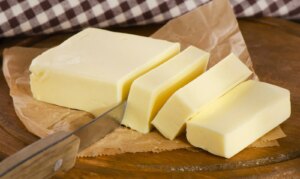
Supermarket chain Coop lowered its milk prices on Monday, citing market competition, despite arguing it was unreasonable to do so. Estonia’s largest cheese and butter producer E-Piim says this creates the expectation that all milk products should be cheap.
Rainer Rohtla, Coop CEO, said Estonian retail chains are experimenting with milk prices as it can give them a competitive advantage.
“But as the largest retail chain in Estonia, the one that sells the most Estonian food, and makes sure that Estonian producers’ goods are respected, Coop has decided that we will do no such thing. This creates a risk of jobs being lost in rural areas, but today this is where we have to sadly admit that we have to go along with the experiment, and that you can also buy Estonian milk from us at an unreasonably low price, so that buyers will not look to a competitor,” Rohtla said on Vikerraadio’s “Uudis+” program on Monday.
“But we hope that the consumer could vote with their feet and say that the price gouging of hard-earned Estonian producers and farmers will not be tolerated in Estonia and is not expected of traders,” he said.
“We will pay the price difference ourselves, but we will not do it in silence, we want to draw wider attention to the situation,” said Rohtla. “A liter of milk in the shop is 20 cents below the fair price, which means that Estonian milk production will eventually come under pressure and jobs will be at risk,” the Coop CEO said.

From Monday, the retail chain will sell milk for 59 cents per liter and 200 milliliters of coffee cream for 39 cents.
A liter of milk costs 57 cents at Rimi and Maxima. Selver’s cheapest milk is 59 cents.
In October, the price of raw milk in the EU average before processing, transportation, storage, and distribution was 51.2 cents including VAT. However, Estonian producers often receive less.
Margus Leek, cheese and butter producer E-Piim CEO, told ERR the price of milk for farmers is low at the moment.
“For our members, it is 38 cents plus VAT. The European average is higher, but our market situation does not allow us to pay more. If shops use their own resources to lower the price of milk, they cannot be forbidden to do so,” he said.

E-Piim produces cheese, so it is not directly affected by the prices of drinking milk, but these price cuts create expectations for customers that all milk products should be cheaper.
“This background is very hostile to our farmers. The state is not going to intervene and set price caps, but from the farmers’ point of view, the milk price is an ethical issue – do people want to keep livestock farming alive in Estonia?” Leek asked.
“In trade, the milk price is an instrument of competitive advantage. It is a topic that comes up every five years when new marketing geniuses come into the trade. I don’t think it’s right – the trade should use other tricks. If we want Estonian agriculture to survive and thrive – this is not a sustainable way of doing business,” he said.
“You can’t tell the trade how high the mark-ups or deductions should be, but playing games with the price of milk is not a nice and ethical thing to do, nor is it respectful to Estonian farmers,” the CEO added. Â
Teet Kallakmaa, manager of Metstaguse Agro OĂś, told ERR the price of milk could be 45 cents per kilo. “Then it would be worth producing this milk,” he said. Currently, Kallakmaa’s company is paid around 40 cents per kilo of milk.
—
Follow ERR News on Facebook and Twitter and never miss an update!



